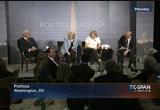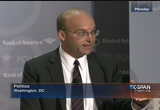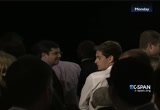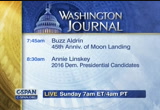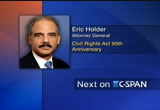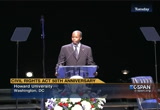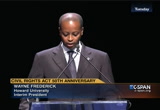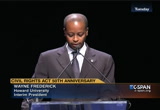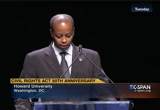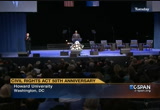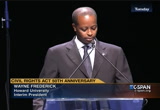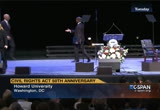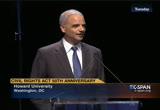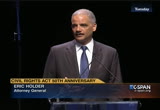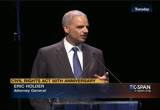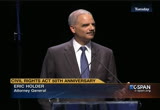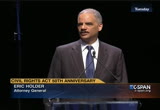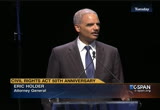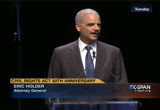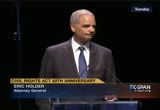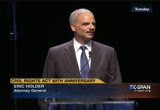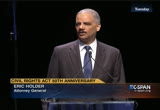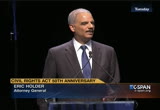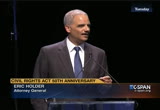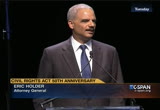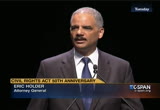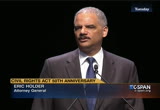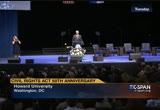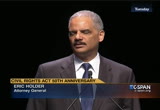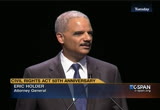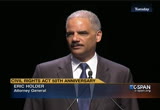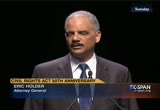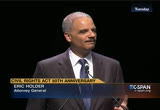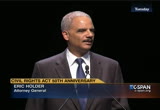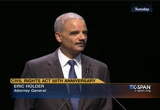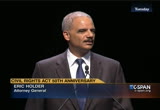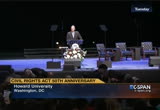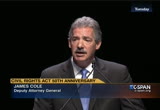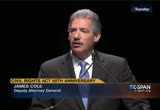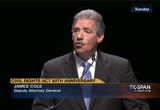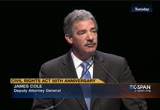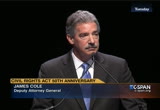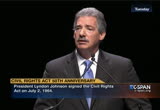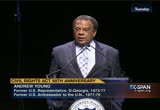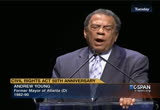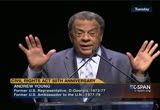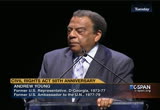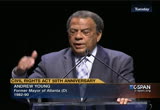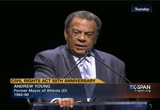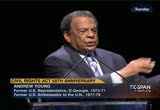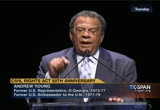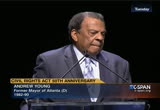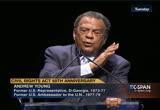tv Eric Holder on Civil Rights CSPAN July 20, 2014 12:04am-12:57am EDT
12:04 am
flyfishing tips? >> don't talk. if he have someone on your boat, don't talk. >> make sure you get home when you tell your wife you're going to be there. [laughter] >> earlier you said that you drive. >> why'd you find that surprising? >> driving your granddaughter. >> first we got grace a horse. you have to have a horse trailer. you have have a truck to haul the horse trailer. i'm the proud owner of a 350 diesel. it is a three horse trailer. the thing that worries me, it is
12:05 am
a three horse trailer. i'm going to need two more horses. >> i want to thank all of you for watching. i want to thank bank of america for making the conversation possible. thank all of you for coming out in the middle of the day. >> thank you. [applause] [captioning performed by national captioning institute] [captions copyright national cable satellite corp. 2014]
12:06 am
12:07 am
>> tomorrow "washington journal," marking the 45th anniversary of the moon landing. buzz aldrin responds. a bloomberg news reporter will talk about talks. she will discuss the democratic presidential candidates. abouttrick clawson talks the status of talks concerning the iran nuclear program. and youtake your calls can join the conversation on facebook and twitter. >> for over 35 years, c-span yougs events directly to putting you in the role of hearings and conferences. and offering you complete gavel to gavel coverage all as a
12:08 am
public service. created by the cable tv industry 35 years ago. watch us in hd and liked us on facebook and follow us on twitter. >> on tuesday, attorney general eric holder spoke at a ceremony at howard university commemorating the 50th anniversary of the signing of the civil rights act. it was signed by president lyndon johnson on july 2, 1964. outlaweded -- discrimination. this is just under one hour.
12:09 am
>> please welcome interim president of howard university, dr. wayne a. i. frederick. [applause] >> welcome. it is with great pride i welcome sur distinguished guest celebrating the 50th anniversary of the civil rights act of 1964. it is an honor to join the department of justice in hosting this symposium. it is my pleasure to acknowledge the following individuals. those whom we are honored to have in our program today, attorney general holder, secretary perez, and secretary duncan. white house officials, members of congress, other elected officials, federal agencies
12:10 am
represented today, leaders and stakeholders from the civil rights community, national archives for the civil rights act, and the distinguished members of the howard university community faculty students, staff, and alumni. the call for comprehensive civil rights legislation gave momentum in 1963 as civil rights activists continued to organize peaceful demonstrations throughout the country. of the nonviolent protesters met with violence in birmingham, alabama, the president delivered
12:11 am
a speech voicing support for comprehensive civil rights legislation. after president can mean these -- after president kennedy's assassination, resident lyndon johnson made a commitment to pursue passage of civil rights legislation. after the longest debate in history, the civil rights act was signed into law, the first of many legislative victories over the next 50 years that have been critical to protecting civil rights. our university has been grounded by the legacy rendered by the outcomes of the dedicated commitment of thousands locals and civil rights activist. signed into law by president lyndon b. johnson on july 2, 1964, the civil rights act outlawed segregation.
12:12 am
today's keynote speaker, eric holder has made protecting civil rights a top priority of his administration of the department of justice. howard johnson awarded him a honorary doctorate. in his commencement address he offered the following insight about the path of civil rights in our country. it is not enough just to open the gates of opportunity. all citizens must have the ability to walk through those gates. this is the next and more profound state of the battle for civil rights. we seek not just freedom but opportunity. we seek not just legal equity, but human ability. not just equality, but equality as a fact and a result. i believe a presentation and
12:13 am
discussion today symposium highlights critical importance of the ongoing work that must continue to guarantee justice and civil rights for all citizens. as we reflect on the anniversary of the passage of 1964 civil rights act we celebrate the activists who sacrifices paved the road to equality. their unwavering commitment strengthened our nation and aspires us to persist. let us rededicate efforts to preserve the gains of the past 50 years in advance an agenda for the future. we must obsess about the journey and not any specific destination. the passage of the civil rights act was the destination. an important one albeit, but not a final one.
12:14 am
like the virtue of love, this is a journey without end. it is my distinct pleasure to introduce to you today the attorney general, eric holder. he was sworn in as the 82nd attorney general of the united states on february 3, 2009 by vice president joe biden. president barack obama announces intention to nominate eric holder in 2008. in 1997, he was named to be the deputy attorney general, the first african american named to that post. prior to that he served as u.s. attorney for the district of columbia. in 1988 mr. holder was nominated by president reagan to become an associate judge of the supreme court. while in law school he was a clerk the naacp legal defense fund and the department of justice, will department. he was assigned to the newly formed public integrity section in 1976. he was asked to investigate and prosecute corruption under local states and federal levels. he has made a protection of civil rights one of the highest
12:15 am
priorities of the department of justice. it is my distinct pleasure to welcome to the podium the attorney general of the united states, eric holder jr. [applause] >> thank you. thank you. thank you. thank you, president frederick, for those kind words -- and thank you all for such a warm welcome. it is a pleasure to be here on the beautiful and historic campus of howard university --
12:16 am
one of our nation's great historically black institutions of higher learning, and home to generations of leaders and role models. i'd like to thank the howard university color guard for being a part of this celebration, and bert cross ii for that exceptional rendition of the national anthem. i also want to recognize ambassador young -- a tireless advocate for the rights of all americans and a proud graduate of this university. [applause] and i want to thank every member of the gay men's chorus, who will share their talents with us later this morning, for helping to make this event so special. i am also mindful, as we gather today, of the leader we lost this past friday. john seigenthaler was a passionate journalist, a lifelong defender of the first amendment, and a fierce civil rights advocate. he was a top aide to my
12:17 am
predecessor as attorney general, robert f. kennedy, and later served as his pallbearer. he risked his life alongside the freedom riders and called forcefully for civil rights protections at a time when most southern journalists turned a blind eye. he was a remarkable man and a singular voice for the cause of justice; a guiding light and an inspiration to many -- including me. i count myself as extremely fortunate to have known john seigenthaler, and extend my heartfelt condolences to his family. he will be dearly missed. but his critical work goes on. it's a privilege to be among so many distinguished guests, including fellow members of the president's cabinet -- howard faculty and administrators; accomplished trailblazers in the fight for civil rights; and young people who will carry on the work we commemorate -- and build on the singular
12:18 am
achievement we celebrate -- here today. half a century ago this month -- with dr. martin luther king, jr. and others at his side -- president lyndon johnson marked an inflection point in a struggle that predated our republic when he signed the landmark civil rights act of 1964. it was a struggle that had begun more than three centuries earlier, in 1619, with the arrival of roughly 20 captive africans in jamestown, virginia. and it continued through the expanding colonization of north america. by 1763, the colonial population included roughly 300,000 africans, the overwhelming majority of whom were slaves. yet it wasn't until a century later that our greatest president issued an emancipation proclamation providing a legal
12:19 am
framework for the eventual release of many slaves -- and secured the thirteenth amendment, which finally struck this evil from our constitution. even then, jim crow laws and other measures were engineered to keep millions of african-americans effectively in bondage, slavery by another name, for a century more. and intimidation and violence were routinely employed to prevent them from becoming educated, to keep them from voting, and to stop them from mixing with the white majority. finally, 60 years ago this may, when chief justice earl warren led a unanimous supreme court to declare, in brown v. board of education, that segregation was unconstitutional, our nation took an important step to reconcile not only two races, but two histories -- two americas -- that had been intensely separate, and profoundly unequal, since long before the american revolution. and ten long years after that -- as long-simmering injustice gave
12:20 am
way to activism and principled action -- the civil rights act of 1964 was adopted to forever enshrine american equality into american law. this historic measure barred discrimination based on race, color, sex, religion, and national origin. it instituted critical employment protections. it outlawed discrimination in public accommodations, including schools and workplaces, and prohibited unequal application of voter requirements. in so doing, it greatly expanded the mandate of the department's civil rights division, which to this day is committed to enforcing the civil rights act and upholding the civil and constitutional rights of all americans -- particularly society's most vulnerable members.
12:21 am
the new statute also created the equal employment opportunity commission as well as the community relations service, which assists vulnerable populations and promotes healing in times of disorder and distress. securing this law was an extraordinary undertaking -- born of a consensus wrought by decades of hard work and profound sacrifice. it required two great presidents -- john f. kennedy, who called on us to confront a moral crisis and fulfill a national promise -- and lyndon johnson, who took action, after president kennedy's assassination, to make that promise real. it required a congress with the fortitude to stand up to those who defended a way of life founded on bigotry and oppression. it required leaders of conviction -- from medgar evers to dr. king; from john lewis to andrew young -- who were willing to risk, and even to give, their lives in order that others might live free. and most of all, it required men, women, and even children of tremendous courage -- and
12:22 am
unwavering faith -- to endure the unendurable and advance the cause of justice. these are the heroes whose legacy we celebrate on this milestone anniversary. these are the pioneers on whose shoulders we now stand. and these are the trailblazers to whom we pay grateful tribute this morning. of course, like all who are old enough to remember those days - when northern cities erupted and mississippi burned -- i will never forget the turmoil, and the violence, that characterized the civil rights era. i will never forget watching, on a black-and-white television in my childhood home in east elmhurst, queens, new york, as countless people -- rich and poor, black and white, famous and unknown -- braved dogs and fire hoses, billy clubs and baseball bats, bullets and bombs, in order to secure the rights to which every american is entitled.
12:23 am
these extraordinary citizens streamed into birmingham and marched on washington. they stood up in little rock and sat-in in greensboro. they faced riots in oxford and walked through a schoolhouse door in tuscaloosa. they dared, during america's "long night of racial injustice," to dream of a more equal society. and they risked everything they had to make it so. this was the fight that, half a century ago, brought nearly a thousand students to mississippi for a voter registration campaign called freedom summer -- as the battle for civil rights was waged in the halls of congress and thundered across the streets of america. inch by inch, the nation as a whole moved slowly forward towards equality.
12:24 am
but mississippi and other states continued to stand in stubborn, racist opposition. registrar offices instituted voting tests and other measures that made it almost impossible for black men and women to go to the polls and vote. citizens -- and even sworn police officers -- fought racial equality and threatened african americans who dared step into voting booths. newspapers published the names of registered black voters so they could be targeted -- and terrorized -- by those who harbored hatred. yet hundreds of young people came to mississippi -- in defiance of these threats and in the face of deadly violence -- to help extend our democracy's "most basic right" to people of color. in the ten weeks of freedom summer, more than 65 buildings were bombed or burned. hundreds of civil rights workers were beaten and arrested. and three brave young men -- andrew goodman, james chaney,
12:25 am
and michael schwerner -- were brutally murdered. yet violence did not send the activists running, as its perpetrators had hoped. instead, it galvanized them -- and the nation. more and more brave americans joined the cause -- both residents of these communities and students of all races from across the country. when they saw that african-americans were being deprived of quality educational opportunities, they established freedom schools to teach black history, to facilitate discussion, and to encourage political activism. these young people devoted themselves to the hope -- as michael schwerner's widow, rita, once wrote -- that they could pass on to the next generation "a world containing more respect for the dignity and worth of all men than that world which was willed to us." the senseless murders of rita's husband and his two colleagues, one black and one white, in a case that became known as mississippi burning, and which captured headlines and sparked outrage across the country.
12:26 am
their tragic deaths moved public opinion, spurred cautious politicians to take long-overdue action, and intensified support for the civil rights act. but their efforts also made possible the voting rights act of 1965; the fair housing act of 1968, and the americans with disabilities act of 1990, along with countless other movements for progress. and although michael and rita schwerner never had the chance to have children of their own, their work -- and the efforts of their friends and fellows - left a better world for me, for my children, and for millions more. as we mark this anniversary, i am especially mindful that, without the civil rights act, the protections it codified, or the monumental progress that followed, few of us would be here this morning. and without the sacrifices of countless activists and
12:27 am
citizens, i would not stand before you as attorney general of the united states, proudly serving in the administration of our first african-american president. i am just as mindful that none of this progress was preordained. we know from our history that advances toward equality and inclusion have never been inevitable. every step forward has been hard-won. the words of our founding documents were not automatically imbued with the force of law. and our nation's future continues to be defined, and its destiny determined, by men and women of both character and conviction, by courageous people who are unafraid to stand up for what they know to be right; and by patriots who never shrink from the responsibility to draw
12:28 am
this country ever closer to its highest ideals. like you, my colleagues -- at every level of today's department of justice, and i are determined to do everything in our power to further these efforts, to protect and expand the work of those who have gone before, and to extend america's promise to new generations and populations that have been too long disenfranchised, overlooked, and oppressed. half a century after its passage, the civil rights act continues to provide an arsenal of singularly useful tools in waging this struggle. and as we speak, the justice department is using provisions of this important law both aggressively and innovatively to confront civil rights challenges old and new. earlier this year, our civil rights division relied on the 1964 act to reach a $99 million employment discrimination settlement with the new york city fire department, the largest such employment settlement to date, ensuring
12:29 am
that all applicants can fairly compete for jobs, and that new yorkers are protected by the best-qualified among them. in 2012, the department used provisions of the act to address harassment against lesbian, gay, bisexual, and transgender students in a minnesota school district, establishing a model for other districts to follow. we are currently employing other provisions to fight for gender equality in education and in the workplace. and we're finding that, in a variety of cases and circumstances from ensuring that schools provide safe and equal opportunities to all of our sons and daughters, to guaranteeing access to state courts for those with limited english proficiency, the civil rights act offers powerful enforcement authorities to address contemporary challenges and safeguard vulnerable people. beyond the act itself, the justice department has worked with our partners throughout the administration, most notably the department of education, led by secretary arne duncan, and the department of labor, led by secretary tom perez, who not long ago led, and, in fact,
12:30 am
helped to revive - our own civil rights division, ushering in what i'm confident will be considered an era of historic achievement for the division. alongside these other agencies, we have worked hard to build on the spirit of the law by winning new legislation and judicial rulings that extend the promise of equality to others. we've secured additional protections for women, latinos, asian americans, american indians, and people with disabilities. and we've achieved historic progress in ensuring the civil rights of lgbt individuals across the country, so they can finally receive the equal opportunities, equal protection, and equal treatment they deserve. all of this is important, life-changing work. it speaks to the timelessness of the civil rights act itself, the continuing relevance of its core provisions, and the need to keep expanding upon the safeguards it provides.
12:31 am
but it also shows that our work is far from over. significant challenges remain before us. each one of us, every american, has a great deal more to do. although we can be proud of the progress that's been made even within our lifetimes, we cannot accept these advances as an indication that our work is complete, that our long journey has been successfully concluded. progress is not an end. it is a measure of effort and of commitment. as we speak, in far too many neighborhoods, far too many people of color and far too many lgbt individuals are denied credit and housing. in the workplace, far too many women are deprived of the opportunity to perform equal work for equal pay, earning on average only 77 cents for every dollar earned by their male colleagues. in our education system,
12:32 am
students of color are far more likely than white children to attend poorly-funded schools. in the criminal justice system, african-american men are routinely subjected to sentences averaging 20 percent longer than those served by white men convicted of similar crimes. and when it comes to our most treasured democratic institutions, many vulnerable populations, including young people, the elderly, and communities of color, are now facing a range of new restrictions, leveled under the dubious guise of voter fraud prevention, that create significant barriers to the ballot box. if these and other conditions -- from lower social and economic mobility, to reduced educational opportunities, to unequal justice and unfair outcomes -- were felt so acutely by the majority of americans, i believe our national dialogue, and our responses to these problems, would be very different. as it stands, our society is not
12:33 am
yet colorblind, nor should it be, given the disparities that still afflict and divide us. we must be color brave and must never forget that all are made better and more prosperous if all are given equal opportunities. that is why today, together, we must resolve once again to act not out of self-interest, but out of national interest. we must take into account not only the considerable steps forward we've seen over the last 50 years, but the entirety of the experience that people of color have faced. and we must never hesitate to confront the fact, the undeniable truth, that in too many places across this nation that i love, and have served throughout my life, that the echoes of injustices stretching back nearly four centuries
12:34 am
continue to reverberate. these echoes from times past are still heard by too many. in addressing these lingering effects, there is a need for personal responsibility. too many individuals act in ways that are negligent or counterproductive. but there is also a need for societal responsibility; for collective engagement and common effort. we must be willing to acknowledge the problems we face, to talk frankly about inequality, and to examine its causes and its impacts and, most importantly, to act to eradicate it. and we must look at our great nation, and reflect on its history, with clarity and with honesty, with open eyes and deep understanding of who we have been, who we aspire to be, and who we are today. this is the key to perfecting our union, and formulating policies that will lead to a better, brighter future for all of our citizens. this is what drives the obama administration's sweeping
12:35 am
efforts to ensure that every american has the chance to succeed based on his or her skills, talent, and potential -- not by the circumstances of their birth. but this is something we'll never be able to do on our own. today, i am calling on congress to renew the spirit of the civil rights act, by updating fair housing and lending laws to address discrimination on the basis of sexual orientation, gender identity, and marital status. [applause] by strengthening workplace protections to prohibit pay discrimination against women and to finally end discrimination against lgbt individuals; by ensuring equal access to education and promoting
12:36 am
nondiscriminatory learning environments, and by passing updated voting rights legislation that will enable every voter, in every jurisdiction, to exercise the rights that so many have fought and died to defend. [applause] after all, the civil rights act of 1964 was an attempt -- and a highly successful one -- to confront fundamental questions that had bedeviled this nation since its inception, and that justifiably generate controversy even today.
12:37 am
this morning, we are reminded that carrying on this work, advancing the cause of justice, and ensuring the civil and human rights of every person -- no matter where they come from, who they are, or who they love, continues to constitute our most solemn obligation. the true greatness of this country lies in our limitless capacity for innovation and invention, for rebirth and renewal, for forging greater societies and reaching new frontiers. as a people, we have never been content to tie ourselves to an unjust status quo, no matter how many individuals may find it acceptable. we challenge; we question; we
12:38 am
struggle, we quarrel. we bind ourselves to the ongoing quest for a better future. and ultimately, we move forward together, as one nation, indivisible, driven by our pursuit of a more perfect union and determined, come what may, to achieve it. that, at its core, is what defines us as americans. a people born of revolution and tested by civil war. a nation founded on equality but built by those in chains. a country first imagined, centuries ago, by imperfect people driven by a near-perfect vision, a vision conceived by patriots who dared to reach beyond themselves and defended later by activists who fought for equal justice, and who challenge us, even today, to make this promise real. to them -- as to generations yet
12:39 am
to come, we owe our best efforts and our deepest resolve. we must take up this challenge and implement this vision. and we must build, in their honor, a world that is worthy of their passion, their sacrifice, and their humanity. like you, i have no illusions that this task will be easy. but as i look around this crowd today -- of passionate men and women, dedicated to truth and devoted to service -- i am confident of our ability to reach that promised land. i thank you for your commitment to progress and to the pursuit of justice. and i look forward to all that we must, and will, accomplish in the months and years ahead. as a nation, as the beloved community, as a united people, we shall overcome. thank you. [applause]
12:40 am
>> please welcome the deputy attorney general of the united states, james cole. [applause] >> history is not just a series of events. it is the people who create those events. it is the impact of the stories told and untold, the many trailblazers and unsung heroes whose tireless sacrifices and relentless dedication have resulted in justice, opportunity, and freedom for all. looking back, we have seen the defining moments in american history resulted from the strategic dedicated, and hard work of risktakers, visionaries, leaders. leaders like president john f. kennedy and lyndon b. johnson,
12:41 am
who refused to accept an unjust status quo. civil rights pioneers like dr. martin luther king jr., joseph lowery, congressman, and many program participants and guests. many of you in this auditorium as well as countless others, in the face of bigotry and violence, called upon our nation to live up to its fundamental ideas of liberty and equality. history is ambassador andrew jackson young, jr., a living legend at a watershed moment for america with enormous or medications for our country in the world. the civil rights movement and
12:42 am
the ultimate passage of the civil rights act of 1964. [applause] ambassador young met the challenges of segregation and discrimination with truly remarkable sacrifices, helping to transform america into a better, stronger, fairer nation. born in new orleans, during the depths of the great depression and jim crow segregation, ambassador young accepted responsibility of service at a young age. in 1960, after receiving his graduate degree at howard university and his divinity degree from hartsfield, he joined the southern christian leadership conference, the civil rights organization led by dr. king. he was soon named the director
12:43 am
of citizenship school program where he employed mahatma gandhi's concept of nonviolent resistance as an organizing strategy and tactics for social change. later, after becoming the executive director of the sclc, he became one of dr. king's most trusted advisers and confidants. he is one of the principal strategists during the civil rights campaigns, in birmingham, selma, and atlanta. it was those campaigns, along with other critical events, that led to the passage of the civil rights act of 1964 and the voting rights act of 1965. even after being beaten and jailed for his participation, and witnessing the devastating assassination of dr. king in 1968, the ambassador's leadership and devotion to public service, social justice,
12:44 am
and human rights never wavered. in 1972, he became the first african-american from the deep south since reconstruction to be elected to the united states congress. in 1977, he became the first african-american to serve as ambassador to united nations. in 1981, he was elected mayor of the great city of atlanta where he served for two terms. in atlanta, he has continued his service to the civil rights cause as a college professor of georgia state university where the policy school is named in his honor. he has established the andrew young foundation and remained active in local, national, and global affairs. in recognition of his vast contributions, ambassador young was awarded the presidential
12:45 am
medal of freedom, the highest civilian award the united states has to the stowe. he has received honorary degrees from more than 100 colleges and universities in the united states and abroad. just when you thought his inventory of accomplishments could not extend further, ambassador young has earned the title of filmmaker, devoted husband, amy award winner, author, and proud father and grandfather. ambassador young, on behalf of a grateful nation and everyone here today, i want to thank you for service to the world. your effort laid the groundwork for a significant part of the justice department's mission to expand opportunity for all people, safeguard the fundamental infrastructure of our democracy, and protect the most vulnerable among us.
12:46 am
our commitment to advancing this work has never been stronger. all of us, together, must move our nation forward toward a more perfect union. one that reflects the values and principles enshrined in our nation's founding documents. your participation here this morning serves as an inspiration for this important work. ladies and gentlemen, join me in welcoming an ambassador for change, ambassador for equality, and ambassador for justice, andrew young. [applause] >> thank you very much.
12:47 am
that was an extremely generous introduction. i want to come back to my days at howard university, days before howard university. it was in 1941 that my sixth-grade teacher took me to a federal courthouse, and i saw a tall, young lawyer by the name of thurgood marshall argue the case of the equalization of teacher salaries in louisiana, 1941. already howard university had started laying the groundwork for what was to come. before that, ralph bunch, one of our professors, was asked to do the intelligence network, to try to understand how america should relate to africa during the second world war. the south africans were supporting hitler.
12:48 am
in 1937 and 1939, he took a leave of absence from howard university and spent two years trying to figure out the world. in the process, he figured out the united nations. i really think ralph bunch probably has more to do with every word in the united nations charter and every institution of united nations that still exists today. i'm saying without howard university, -- [applause] without thurgood marshall, judge hastie, and many others, we would not have had any basis for marching. i got out of here 63 years ago. [laughter] [applause]
12:49 am
i said, lord, if you give me one more chance. i promise you i will do better. i didn't know what had happened to me here. i neglected my studies, none of my teachers knew my name. i got one hell of an education. [applause] don't play yourselves cheap. don't let anyone else define you. let me go to december 17, 1962. bridge shuttle's church was bombed. it was bombed for the third time in the last 18 months. there were 60 unsolved bombings at homes where nobody had ever been charged or investigated.
12:50 am
the house came completely down, and everybody was sure fred was dead. he walks out of there with his shirt and tie on and says, "if this didn't kill me, i can do anything i want to do." he came to atlanta and got us to say we couldn't sit back and wait for desegregation. we couldn't continue to be passively nonviolent. or had to be an aggressive nonviolent movement. much to my surprise. martin luther king was no militant. on this occasion he said dias. we must. i said oh, lord. but we ended up going to birmingham. a few months later, we had a
12:51 am
plan to confront segregation. you heard about the dogs, the jailing's, you heard about the fire hoses. that wasn't it. the plan was that 300,000 citizens of color would not spend a nickel on anything but food or medicine until the economy changed. birmingham was an economic movement more than a marching movement. when you pull 300,000 citizens out of the economy, everybody was underwater. my job was to try to negotiate with them to help them realize it was really not going to get any better unless they took down the signs, allow people to work, instead we can't qualify.
12:52 am
that's not true. the maids you have wearing white, embarrassing suits, know more about your departments. talk to your wives. they come to when they want to shop at your store and know where something is. they don't go to the clerks. they go to the made. they are running your business anyway. we ended up one by one helping them overcome the obstacles. there's no such thing as why water and blackwater. take the signs down. it was really very simple. only because we refused to cooperate with injustice. in that noncooperation, we slowly but surely refashion society.
12:53 am
that's about the time the community relations service was born. it wasn't called that then. it was really bert marshall and others from the justice department that while we were talking with businessmen on one side, they were talking with businessman on the other side. it was not a children's crusade. the people that we organized to go to jail were juniors and seniors in high school. they would have been going to vietnam in another year. have graduated. for us it said why not stand up for freedom in your own hometown because you're not going to have a choice. the president of the student body, the captain of the football team, the leader of the band, a key group of leaders
12:54 am
from each high school went to jail early in april. they went to jail to have an experience. they had a religious experience. they went to jail with the ministers and the civil rights movement. when they came out they were changed. their purpose was to organize their high schools for d-day, which was may 5, 1963. on may 5, 1963, every high school in birmingham and surrounding counties closed down. the principals locked the gate. they walked, some as many as 25 miles to get to the center birmingham to get to jail. by that time everybody knew it was all over. the justice department was able, in 1963, to get 100 businessman to sign an agreement that met the challenges that had been
12:55 am
offered by the alabama christian movement for human rights. 100 businessman sign that, even though it was against george wallace's law. but it worked. it changed. people settling acted different. -- people suddenly acted different. we never had problems at the lunch counters. the reason was, the south was basically comfortable racially. but for a few hoodlums, once they range in the hoodlums, we were able to move forward.
12:56 am
with the help of a courageous congress and the coming together of the churches, business community, behind the congress and the president, we were able to pass the 1964 civil rights act. don't forget. the hundred businessman agreed to it a year before the congress passed. when i said it to harry oppenheimer, he said do you think that will work in south africa? i said sure. anytime 100 businessmen decide they are going to change society, and they are far more vulnerable, you had a businessman in his pocketbook for 10% and you have his soul. [laughter] [applause] at least his attention. we took some of the same ideas into south africa, all around
71 Views
IN COLLECTIONS
CSPAN Television Archive
Television Archive  Television Archive News Search Service
Television Archive News Search Service 
Uploaded by TV Archive on

 Live Music Archive
Live Music Archive Librivox Free Audio
Librivox Free Audio Metropolitan Museum
Metropolitan Museum Cleveland Museum of Art
Cleveland Museum of Art Internet Arcade
Internet Arcade Console Living Room
Console Living Room Books to Borrow
Books to Borrow Open Library
Open Library TV News
TV News Understanding 9/11
Understanding 9/11